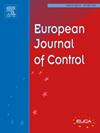Robust design of phase-locked loops in grid-connected power converters
IF 2.5
3区 计算机科学
Q2 AUTOMATION & CONTROL SYSTEMS
引用次数: 0
Abstract
Phase-locked loop (PLL) algorithms are key elements for the successful integration of converter-interfaced renewable energy sources to the grid. Their main task is to estimate the phase angle of the terminal grid voltage with the aim to keep the converter output current synchronized to it. Yet, due to the increasing penetration of power-electronics-interfaced devices in power systems, the grid voltage signal becomes increasingly disturbed, making the reliable phase estimation a highly demanding task. To address this challenge, we present a robust design method based on matrix inequalities to tune the PLL gains, such that the estimation errors remain bounded in the presence of additive disturbances. Our design approach is formulated as a set of bilinear matrix inequalities (BMIs), which we then propose to solve using the P-K iteration method. This results in a convex problem to be solved at each step. Finally, the benefits of the proposed robust design are illustrated via a numerical example.
并网变流器中锁相环的稳健设计
锁相环(PLL)算法是将可再生能源变流器成功并入电网的关键因素。其主要任务是估算终端电网电压的相位角,以保持变流器输出电流与之同步。然而,由于电力系统中电力电子接口设备的渗透率越来越高,电网电压信号受到的干扰也越来越大,因此可靠的相位估算成为一项要求极高的任务。为了应对这一挑战,我们提出了一种基于矩阵不等式的稳健设计方法来调整 PLL 增益,从而使估计误差在存在加性干扰时保持在一定范围内。我们的设计方法被表述为一组双线性矩阵不等式 (BMI),然后我们建议使用 P-K 迭代法来求解。这样,每一步都要解决一个凸问题。最后,我们将通过一个数值示例来说明所提出的稳健设计所带来的好处。
本文章由计算机程序翻译,如有差异,请以英文原文为准。
求助全文
约1分钟内获得全文
求助全文
来源期刊

European Journal of Control
工程技术-自动化与控制系统
CiteScore
5.80
自引率
5.90%
发文量
131
审稿时长
1 months
期刊介绍:
The European Control Association (EUCA) has among its objectives to promote the development of the discipline. Apart from the European Control Conferences, the European Journal of Control is the Association''s main channel for the dissemination of important contributions in the field.
The aim of the Journal is to publish high quality papers on the theory and practice of control and systems engineering.
The scope of the Journal will be wide and cover all aspects of the discipline including methodologies, techniques and applications.
Research in control and systems engineering is necessary to develop new concepts and tools which enhance our understanding and improve our ability to design and implement high performance control systems. Submitted papers should stress the practical motivations and relevance of their results.
The design and implementation of a successful control system requires the use of a range of techniques:
Modelling
Robustness Analysis
Identification
Optimization
Control Law Design
Numerical analysis
Fault Detection, and so on.
 求助内容:
求助内容: 应助结果提醒方式:
应助结果提醒方式:


